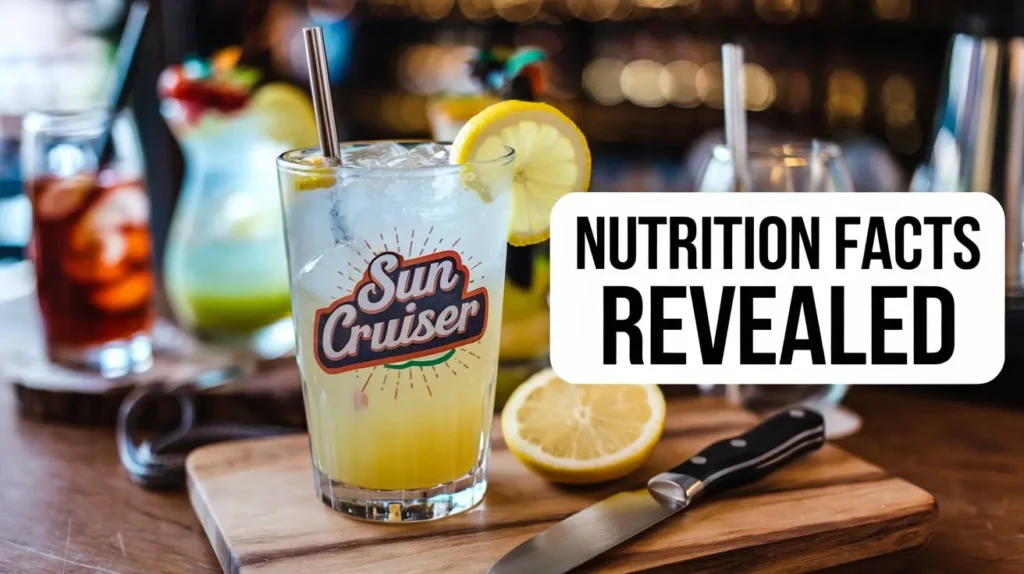This article dives deep into the Sun Cruiser Drink’s nutrition facts. From calories to sugar content, we’ll cover everything you need to make an informed decision. In a world where energy drinks, sports drinks, and refreshing beverages dominate the market, it’s important to know what you’re consuming. One such drink gaining attention is the Sun Cruiser Drink and its nutrition facts. Packed with vibrant flavors and marketed as a refreshing choice, many wonder just how healthy it is.
What Is Sun Cruiser Drink?
The Sun Cruiser Drink is a popular beverage known for its bright, citrus flavors. It’s often enjoyed as a refreshing drink on hot days or after a workout. Some people see it as an alternative to sugary sodas and other flavored beverages. However, how does it compare nutritionally?
Why You Should Know the Nutrition Facts
Understanding the nutrition content of any drink is crucial, especially if you have health goals in mind. Whether you’re watching your calorie intake, monitoring sugar consumption, or looking for a hydrating option, knowing the facts allows you to make healthier decisions.
Let’s take a closer look at the nutritional breakdown of Sun Cruiser Drink.
Calorie Count: How Many Calories Are in Sun Cruiser Drink?
Calories are one of the first things people check when examining a drink’s nutrition facts. The calorie content in a drink can significantly impact your daily intake, especially if you consume multiple servings.
A standard serving (12 oz or 355 mL) of Sun Cruiser Drink typically contains around:
- Calories: 120 – 150
This number may vary slightly based on flavor and ingredients, but it’s a good estimate for most varieties. Compared to sugary sodas, this calorie count is moderate. However, if you’re trying to lose weight or reduce your calorie intake, it’s worth considering how many of these drinks you consume.
Sugar Content: A Key Nutritional Element
Sugar plays a major role in the taste of most drinks, but it can also have a significant impact on your health. High sugar intake can lead to weight gain, increased risk of diabetes, and other health issues.
On average, a 12 oz serving of Sun Cruiser Drink contains:
- Sugar: 25 – 35 grams
To put this in perspective, the American Heart Association recommends a daily sugar intake of no more than 25 grams for women and 36 grams for men. Drinking just one Sun Cruiser can nearly max out your daily sugar allowance. If you’re watching your sugar intake, this is a critical factor to consider.
Carbohydrates: A Quick Breakdown
Carbohydrates are an essential energy source for the body, but too many can lead to weight gain if not properly balanced with exercise. The sugar content in the Sun Cruiser Drink contributes significantly to its carbohydrate count.
In a 12 oz serving, you can expect:
- Carbohydrates: 30 – 40 grams
This amount is typical for sweetened beverages, but it’s worth noting that the carbs come almost entirely from sugars. If you’re following a low-carb diet or managing your carbohydrate intake for health reasons, this drink may not be the best choice.
Is There Any Fiber?
Like most beverages in its category, the Sun Cruiser Drink contains:
- Dietary Fiber: 0 grams
While some fruit-based drinks or smoothies may offer fiber, this drink does not. It’s important to get fiber from other sources in your diet, like fruits, vegetables, and whole grains, if you enjoy beverages like the Sun Cruiser.
Protein: Minimal Contribution
Protein is crucial for muscle repair, energy, and overall body function. Unfortunately, most sugary beverages don’t offer much in the way of protein, and the Sun Cruiser Drink is no exception.
In one serving, you’ll find:
- Protein: 0 grams
If you’re looking for protein in your drink, it’s better to opt for options like protein shakes, smoothies, or even milk-based beverages.
Fat Content: Low but Present
Most flavored drinks, including the Sun Cruiser, are low in fat. However, there are still trace amounts that come from natural or added ingredients.
In a 12 oz serving, expect:
- Total Fat: 0 – 1 grams
- Saturated Fat: 0 grams
- Trans Fat: 0 grams
These levels are low and unlikely to impact your daily fat intake. However, if you’re following a low-fat diet, this drink will easily fit within your dietary guidelines.
Sodium: Watch Your Salt Intake
Sodium is an essential nutrient that helps maintain fluid balance and nerve function. However, consuming too much sodium can lead to high blood pressure and other health issues. Many processed drinks contain hidden sodium, even if they don’t taste salty.
In one serving of Sun Cruiser Drink, you’ll find:
- Sodium: 15 – 25 mg
This sodium content is relatively low compared to other beverages, particularly sports drinks that tend to have higher levels. For most people, the sodium in the Sun Cruiser won’t be a significant concern unless you’re on a strict low-sodium diet.
Vitamins and Minerals: Any Nutritional Benefits?
While the Sun Cruiser Drink offers plenty of flavor, it doesn’t offer many vitamins or minerals. Most flavors contain little to no added nutrients, meaning that this drink is more about taste than health benefits.
You can expect minimal amounts of:
- Vitamin C: 0 – 2% of daily recommended intake
- Calcium, Iron, Potassium: Trace amounts
If you’re looking for a drink rich in vitamins and minerals, you may want to consider fruit juices, smoothies, or enhanced water options instead.
Are There Any Artificial Ingredients?
Sun Cruiser Drink uses both natural and artificial ingredients to achieve its flavors and colors. Common artificial ingredients found in this type of drink include:
- Artificial Flavors: Added to enhance or replicate certain flavors
- Artificial Colorings: Used to give the drink its vibrant, appealing appearance
While these ingredients are approved for consumption, some people prefer to avoid artificial additives for health reasons. If you’re someone who opts for more natural products, this is something to keep in mind.
How Does Sun Cruiser Compare to Other Drinks?
When it comes to comparing Sun Cruiser Drink to other beverages, here’s how it stacks up:
- Soda: Sun Cruiser contains fewer calories than most sodas but has a similar sugar content.
- Sports Drinks: Compared to sports drinks, Sun Cruiser has less sodium but similar calories and sugar.
- Juice: Most juices have similar or higher sugar content but offer more vitamins and minerals.
- Water: Unsurprisingly, water remains the healthiest option with zero calories, sugar, or artificial ingredients.
Should You Drink Sun Cruiser Regularly?
While Sun Cruiser can be an enjoyable, refreshing drink, it’s best to consume it in moderation. The high sugar content and moderate calorie count can quickly add up, especially if you’re drinking multiple servings in a day. For those focused on health, weight loss, or managing sugar intake, this drink might not be the best daily choice.
Healthier Alternatives to Consider
If you love the taste of Sun Cruiser but are looking for healthier options, consider these alternatives:
- Infused Water: Create your own citrus-flavored water with slices of lemon, lime, or orange.
- Sparkling Water: Flavored sparkling waters offer the fizz and flavor without the calories and sugar.
- Diluted Juice: Mix fruit juice with water for a lighter, lower-calorie beverage.
These alternatives provide refreshing flavor without the added sugar and calories.
Conclusion: Is Sun Cruiser a Healthy Option?
When it comes to flavored beverages, Sun Cruiser Drink is a moderate choice. It offers fewer calories than soda and lower sodium than sports drinks but still contains a significant amount of sugar. For those looking to indulge in a refreshing, citrus-flavored drink occasionally, it can be a fun treat.
However, if you’re focused on maintaining a low-sugar, low-calorie diet, it’s essential to limit your intake of Sun Cruiser or opt for healthier drink alternatives. Remember, balance is key in any diet, and moderation is always a good strategy when it comes to sugary beverages.
By understanding the nutrition facts of Sun Cruiser Drink, you can make more informed choices that align with your health goals. Enjoy your drink, but do so with an awareness of its nutritional impact.



